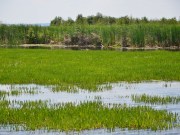By: Mike Anderson
Despite a provincial ban on Airbnb and other short-term rentals operating during the COVID-19 pandemic, more than 300 Airbnb stays in Georgina are available for booking on the company’s website. These range from private rooms to large cottages able to accommodate up to 16 people.
Issued under the Emergency Management and Civil Protection Act, the provincial ban stipulates that as of 11:59 pm on April 4, short-term rentals are only permitted for individuals “who are in need of housing during the emergency period.”
If found breaking the emergency law, individual hosts could face fines up to $100,000 and $10,000,000 for corporations.
Airbnb has posted a disclaimer on its site, which asks potential guests to “check travel restrictions before booking. The health and safety of our communities come first. Please follow government guidelines and travel only if it’s essential.”
However, the majority of local hosts the Post contacted did not make any reference to the provincial ban in their house rules, or in subsequent emails with the Post.
In fact, several Airbnb hosts were prepared to rent their properties to large groups, including one that was offering seven bedrooms.
Only one Airbnb host refused the booking, citing the new provincial regulations.
While the Town of Georgina recently launched a short-term rental licensing program in January 2020, according to a town spokesperson, so far, only two short-term rental hosts have purchased a license to operate in Georgina.
That means the vast majority of Airbnb hosts offering bookings in Georgina are operating illegally and possibly breaking the province’s emergency laws.
The Town has notified the two licensed hosts about the provincial ban, however, it will rely on bylaw officers to police unlicensed hosts, on a case-by-case basis, who are operating in violation of the Town’s bylaws and provincial emergency laws, according to the spokesperson.
The challenge of policing hosts may prove to be too difficult for smaller municipalities, like Georgina, according to Thorben Wieditz, director of Fairbnb Canada, an organization that promotes government regulation for short-term rental platforms, like Airbnb.
Mr. Wieditz says municipalities sending out bylaw officers is a lot like playing “whack-a-mole”:
“It’s very difficult to enforce it on a complaints driven basis. That’s why I’m saying that the right approach would be for Airbnb to close its platform, to not even accept any bookings during a particular time period because that way you put the responsibility to comply on the actual corporation.”
If Airbnb is not prepared to act, Mr. Wieditz wants the province to shut down the platform, citing the example of the United Kingdom, where the government no longer allows Airbnb bookings.
“The province should call Airbnb to order them to basically cease operation during the pandemic,” he says.
Mr. Wieditz does acknowledge there is a need for temporary housing for those displaced by the pandemic. But he says Airbnb and other online platforms should establish call centres to assist healthcare workers and others seeking housing.
Susan Jagminas, a longtime Keswick resident who has advocated for stiffer regulations for short-term rentals in Georgina, agrees that smaller municipalities don’t have the resources to tackle the problem.
Ms. Jagminas says Airbnb must take more responsibility for policing its hosts.
She personally contacted several Airbnb hosts who told her they weren’t aware of the ban, but promised to take down their listings in Georgina, which, according to Ms. Jagminas, they immediately did.
“It’s their responsibility as a host to know what the regulations are in their municipality,” she says. “But I feel Airbnb could do a better job of letting people know what their responsibilities are as hosts.”
“It shouldn’t be up to people like myself searching. I’m sure it shouldn’t be up to the Town either to go after these people. That’s Airbnb’s responsibility. If anyone’s to blame in this whole fiasco, it’s Airbnb.”
- The Canadian Moose are off to Vietnam - October 11, 2025
- Province set to ban speed cameras, as Town defends their use - October 9, 2025
- Celebrating the harvest: A look back at farming in Georgina - October 8, 2025










































